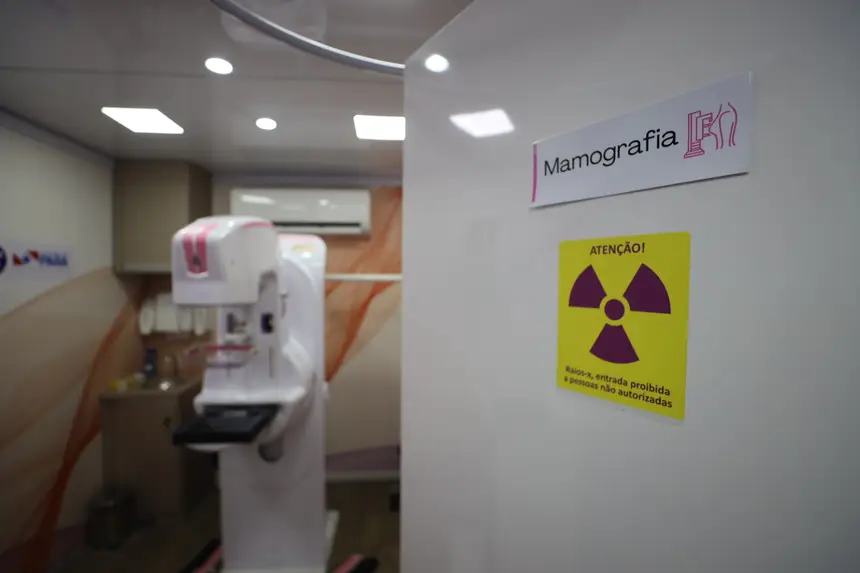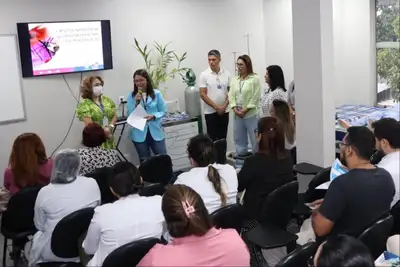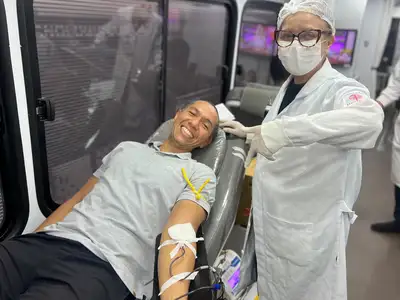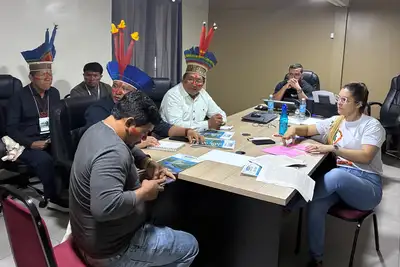Sespa reinforces the importance of early diagnosis and breast cancer prevention
Pink October has intensified actions focused on screening and awareness

Focusing on prevention and early diagnosis, the State Department of Public Health of Pará (Sespa), through the State Coordination of Oncological Care, promotes a series of actions throughout this month in reference to the Pink October campaign. With the theme "Come take care of yourself," in 2025, the mobilization aims to raise awareness among the population about the importance of regular medical follow-up and the performance of exams, especially mammography.
During the campaign, Sespa expands the offer of mammograms and specialized consultations at polyclinics, regional hospitals, and other units of the state network. The activities aim to reinforce early screening, an essential step to detect breast cancer in its early stages (when the chances of cure are significantly higher).
In addition, lectures, discussion groups, and educational actions will be held in municipal health units, focusing on awareness, prevention, and encouraging women's self-care.
Early diagnosis saves lives
Nurse Michele Monteiro Sousa, from the technical team of Sespa, emphasizes that women's leadership in caring for their own health is fundamental. "Our main goal is to encourage women to seek primary care services and request mammography as part of preventive care. Early detection saves lives," she reinforces.
Michele Sousa explains that breast cancer is the most diagnosed malignant neoplasm among women worldwide. In Pará, the estimate for 2025 is approximately 1,020 new cases. "It's a significant number, but there is treatment, and mainly, real possibilities for prevention and health promotion," she assesses.
She also draws attention to warning signs, such as: lump in the breast, inverted nipple, localized swelling, pain, or changes in the skin of the area. "The essential thing is for women to know their bodies. Self-care and self-knowledge are allies not only of physical well-being but also emotional. The motivation to have a mammogram and clinical examination with a primary care professional should be part of the care routine," she highlights.
Another important point, according to the nurse, is attention to lifestyle habits. "Avoiding ultra-processed foods, prioritizing local fruits and vegetables, maintaining a balanced diet, engaging in physical activities, and controlling body weight are measures that help reduce risks," she advises.
She also reminds that diagnosis involves more than just mammography: "The clinical examination performed by nurses or doctors is essential to determine, for example, whether the patient should first undergo an ultrasound or a mammogram."
A recent update in the guidelines from the Ministry of Health now recommends access to mammography for women aged 40 to 49, even without symptoms, as long as the decision is shared between doctor and patient. Previously, the priority age range was 50 to 69 years. Now, the exam can be requested and performed free of charge through the Unified Health System (SUS).
Treatment and care network in Pará
The treatment of breast cancer can be local with surgery or radiotherapy, or systemic, such as chemotherapy, hormone therapy, or targeted therapies. All these services are available through SUS in Pará.
Specialized care is offered at the following units:
• Ophir Loyola Hospital (HOL) – Belém
• João Barros Barreto University Hospital – Belém
• Castanhal Regional Hospital
• Lower Amazon Regional Hospital (HRBA) – Santarém
• Tucuruí Regional Hospital
• Southeast Pará Regional Hospital “Dr. Geraldo Veloso” – Marabá
The first care and referral should occur through primary care, at the municipal Health Units. Suspected or confirmed cases follow the State Oncology Access Protocol, being directed to specialized centers.
Expanded actions throughout the state
Among the actions that will be intensified during Pink October is the operation of the Women's Truck, which brings specialized care to municipalities in the interior. The initiative offers consultations with mastologists and gynecologists, performs ultrasounds, mammograms, and, if necessary, direct referrals for biopsies through regulation.
At the same time, Sespa will carry out initiatives in partnership with polyclinics and regional hospitals to expand the offer of exams and consultations, aiming to reduce the waiting list and improve access to diagnosis.
Understand breast cancer
According to the National Cancer Institute (INCA), breast cancer is caused by the abnormal multiplication of cells in the breast, forming a tumor that can invade other organs. There are different types of the disease, some more aggressive than others, but when detected early, they generally have a high success rate in treatment.
Although rare, breast cancer can also affect men, representing about 1% of cases. Treatment is available free of charge through SUS.
Some risk factors for breast cancer:
• Family history of the disease
• Obesity and overweight
• Sedentary lifestyle
• Excessive alcohol consumption
• Smoking
• Frequent exposure to ionizing radiation
Text from Ascom Sespa











